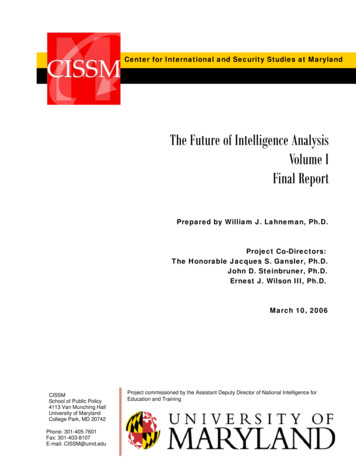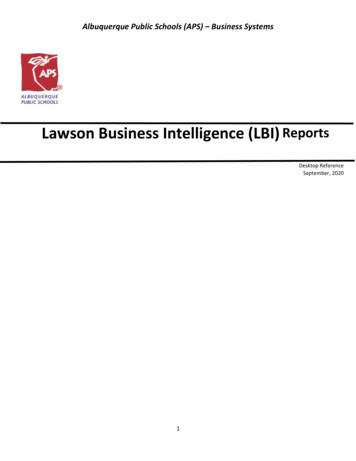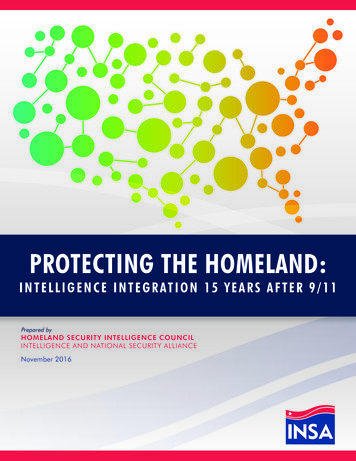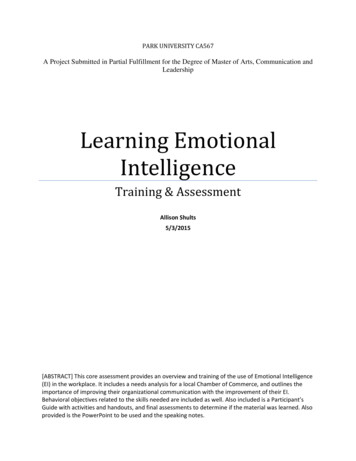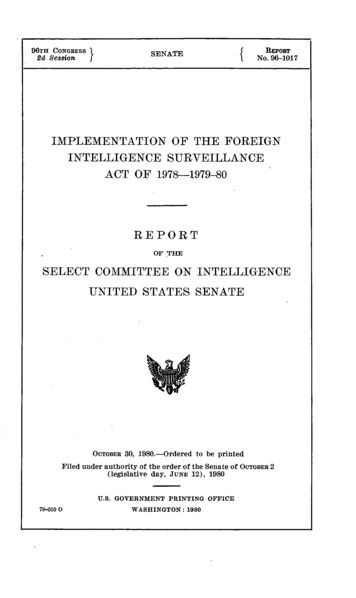
Transcription
96TH CONGRESS2d SessionISENATESENIIlRE2ozNo. 96-1017IMPLEMENTATION OF THE FOREIGNINTELLIGENCE SURVEILLANCEACT OF 1978-1979-80REPORTOF THESELECT COMMITTEE ON INTELLIGENCEUNITED STATES SENATEOCTOBER 30, 1980.-Ordered to be printedFiled under authority of the order of the Senate of OCTOBER 2(legislative day, JUNE 12), 1980U.S. GOVERNMENT PRINTING OFFICE79-010 0WASHINGTON: 1980
96Tu CONGRESS dSENATElSessionREPORTNo. 96-1017IMPLEMENTATION OF THE FOREIGN INTELLIGENCESURVEILLANCE ACT OF 1978-1979-80OCTOBER 30, 1980.-Ordered to be printedFiled under authority of the order of the Senate of October 2 (legislative dayJune 12), 1980Mr.BAYII,from the Select Committee on Intelligence,submitted the followingREPORTIMIPLEMENTATION OF THE FOREIGN INTELLIGENCE SURVEILLANCE ACT OF1978-1979-80I. INTRODUCTIONThe Foreign Intelligence Surveillance Act of 1978, Public Law95-511, 92 Stat. 1783, et seq., requires that each year for five yearsafter enactment the Senate Select Committee on Intelligence shallreport to the Senate concerning the implementation of the Act. Suchreports are to include an analysis and recommendations concerningwhether the Act should be (1) amended, (2) replaced, or (3) permitted to continue in effect without amendment. This is the secondannual report of the Select Committee under the Act. The first report,submitted in 1979, concluded that the brief experience since all procedures of the Act had become applicable did not provide sufficientgrounds for consideration at that time of amending or replacing theAct. Therefore, the Select Committee recommended that the Actshould be permitted to continue in effect without amendment.During the past year the Select Committee has conducted a continuing analysis of the Act and oversight of its implementation basedon information obtained from the Attorney General and the agenciesconcerned. The Act requires the Attorney General to inform the SelectCommittee fully, on a semiannual basis, concerning all electronic surveillance under the Act. In addition to the information set forth inthe Attorney General's reports, further specific information concerning electronic surveillances under the Act and related matters hasbeen provided to the Select Committee by the Department of Justiceand the agencies that conducted the surveillances.Two significant developments during the past year may requireaction by the Senate during the next session of Congress. First, the59-010 0
2Executive branch has expressed concern about the need for severalamendments to the Foreign Intelligence Surveillance Act to addressmatters that have arisen during the course of its implementation. TheSelect Committee considered these proposals as part of intelligencecharter legislation in 1980, but final recommendations were postponed.Second, during the past year, applications have been made to judgesof the Foreign Intelligence Surveillance Court for orders approvingthe use of techniques, other than electronic surveillance as defined inthe Foreign Intelligence Surveillance Act, to acquire foreign intelligence information. These techniques would have required a judicialwarrant if they had been employed for law enforcement purposes.Orders approving such techniques were issued by the judges to whomthe applications were made. There is no statutory authority for theuse of these techniques for foreign intelligence purposes. Nor is thereexpress statutory jurisdiction for judges of the Foreign IntelligenceSurveillance Court to issue orders approving the use of such techniques. Therefore, the actions of the Executive branch and the legalbasis for the court orders will require the most careful examination.Legislation may be necessary to clarify the authority of the Executive branch and the role of the judiciary in the collection of foreignintelligence information by means of techniques (other than electronicsurveillance as defined in the Foreign Intelligence Surveillance Act)which require a judicial warrant when used for law enforcementpurposes. The Select Committee has considered, as part of intelligencecharter legislation, statutory authorization for the use of such techniques including court order requirements similar to the Foreign Intelligence Act. Under that legislation, judges of the Foreign Intelligence Surveillance Court would have been given express statutoryjurisdiction to issue such orders. However, the Select Committee haspostponed any recommendations on such legislation. The decision ofthe Executive branch to employ such techniques and to seek courtorders approving their use, in the absence of express statutory authorization, raises important questions that should be addressed in the nextsession of Congress.II.IMPLEMENTATIONOF THE ACTNumber of applicationsand order8The Foreign Intelligence Surveillance Act requires the AttorneyGeneral to transmit in April of each year to Congress and the Administrative Office of the United States Courts a report setting forth withrespect to the preceding calendar year (a) the total number of applications made for orders and extensions of orders approving electronicsurveillance under the Act; and (b) the total number of such ordersand extensions either granted, modified, or denied. On April 8, 1980,Attorney General Benjamin R. Civiletti submitted the following report to the Senate pursuant to this requirement:During calendar year 1979, 199 applications were made fororders and extensions of orders approving electronic surveillance under this Act. The United States Foreign IntelligenceSurveillance Court issued 207 orders granting authority forthe requested electronic surveillances. No orders were enteredwhich modified or denied the requested authority.
3These statistics covered the period from May 18, 1979, when theChief Justice first designated the seven United States district courtjudges to serve on the court. until the end of 1979. To protect thesecurity of properly classified information, no additional quantitative indication of the extent to which electronic surveillance underthe Act has been used is being made public by the Select Committeein this report.It should be noted, however, that the Act provides for the issuanceof several different types of orders and extensions of orders approvingelectronic surveillance under the Act. An order may approve anelectronic surveillance of certain types of foreign powers for as longas one year. An order may approve an electronic surveillance of anyother type of foreign power, or an agent of a foreign power, for nolonger than ninety days. Extensions of orders may be granted forthe same time-periods (with a limited exception) on the basis of newfindings made by the court in the same manner as required for anoriginal order. Additional orders may be issued to direct that a specified person furnish information or assistance necessary to accomplishthe surveillance. As the public statistics indicate, an application foran order or an extension results in some cases in the issuance of morethan one order. A detailed breakdown of the number of surveillancesof foreign powers and agents of foreign powers in each category isreported to the Select Committee.Designation of judgesThe terms of the first seven judges designated to serve on the ForeignIntelligence Surveillance Court were staggered in accordance withthe Act so that one term expires every year or, in the case of thethree-judge court of review, every two or three years. On May 18,1980, the one-year term expired for Thomas Jamison MacBride, SeniorJudge, United States District Court, Eastern District of California.The Chief Justice designated as his successor to serve a full seven-yearterm William C. O'Kelley, District Judge, United States DistrictCourt, Northern District of Georgia.Executive branchimplementationThe Select Committee has reviewed the administrative practicesadopted by the Executive branch for the implementation of the Act.Only two intelligence agencies have conducted electronic surveillancepursuant to court order or Attorney General certification under theAct-the Federal Bureau of Investigation and the National SecurityAgency. The FBI conducts electronic surveillance for foreign counterintelligence purposes and, when requested by officials of the Intelligence Community designated by the President, may conduct electronicsurveillance to collect positive foreign intelligence. The National Security Agency is limited by Executive Order 12036 to signals intelligence and communications security activities. Executive Order 12036bars the Central Intelligence Agency from engaging in any electronicsurveillance within the United States, except for training, testing, anddefensive "sweep" purposes that are strictly limited by the Act andmay not be targeted at the communications of a particular person.The certifications and applications for orders under the Act areprepared by the agencies that conduct the surveillance in consultation with the Department of Justice. In 1979, Attorney General
4Griffin B. Bell established an Office of Intelligence Policy and Reviewwithin the Justice Department. This office is headed by a Counsel forIntelligence Policy appointed by the Attorney General and subject tothe general supervision and direction of the Attorney General or,when appropriate, the Deputy Attorney General. The Counsel andhis office have general responsibility for all intelligence matters within the Department of Justice including policy and operational matters.The Counsel is specifically directed to supervise the preparation andsubmission to the court of certifications and applications for ordersunder the Foreign Intelligence Surveillance Act. The Counsel is alsoresponsible for advising the Attorney General, other parts of the Justice Department, and other executive agencies on questions relatingto the interpretation and application of statutes, regulations and procedures relating to U.S. intelligence activities.'For each application to the court, the Federal officer making theapplication is an official having operational responsibilities in theagency that conducts the surveillance. An attorney from the Office ofIntelligence Policy and Review represents the applicant agency before the court. Each application is approved by the Attorney General(or Acting Attorney General) or the Deputy Attorney General basedupon his findings that it satisfies the criteria and requirements of theAct. Each application also contains a certification by a senior executive official in the area of national security of defense that the surveillance is undertaken to obtain foreign intelligence information thatcannot reasonably be acquired by normal investigative techniques.Section 102 (a) provides for a narrow class of electronic surveillances without a court order if the Attorney General certifies in writing under oath that such surveillance is directed solely at specifiedtypes of foreign powers, and that communications of United Statespersons are unlikely to be acquired. The Attorney General's certifications are transmitted under seal to the Foreign Intelligence Surveillance Court. The Clerk of the court numbers such certifications insequence and maintains a record of all such certifications by designated number and date of rceipt. The minimization procedures forsuch surveillance were submitted to the Select Committee on June 27,1979, and no changes thereto have been reported to the Committeesince then. Discussions with Executive branch officials clarified forthe Committee certain aspects of these procedures, which are not subject to court review. The Chairman and Vise Chairman have advisedthe Attorney General of the Select Committee's understandings, andthe Attorney General has provided for periodic assessment ofcompliance.Assessment of implenentation* In the course of the Select Committee's oversight of the implementation of the Act, the Committee has discovered that certain paperwork problems result in delays in the processing of applications andcertifications. These problems are not generally due to the requirementsof the Act, but primarily to the administrative practices of the Executive branch. In urgent cases when time is of the essence, the paperwork obstacles have been overcome without great difficulty. Some adjustment in the 24-hour time limitation for emergency surveillance1 28 C.F.R. Subpart F-1, sec. 0.33a-c.
5without a court order has been suggested, as discussed in Part III.However, the principal problem appears to arise in more routine casesof applications for extensions of ongoing surveillances. There is a riskthat, because of administrative delays in preparing for applicationsand scheduling court appearances, lawful surveillance coverage maybe interrupted when an extension is not obtained before the expirationof the previous court order. Greater efforts could be made to streamline the administrative practices to prevent such occurrences. The Select Committee intends to monitor such efforts in the next year before considering any change in the time-period for extensions in certain types of cases.A question has also arisen as to whether the Act permits the Attorney General to authorize physical entry of property or premisesthat may be necessary for an electronic surveillance conducted withouta court order under section 102(a). An amendment to the Act to resolve this question is discussed in Part III.The Select Committee has reviewed with special care the surveillances conducted under the "agent of a foreign power" standard. Theinformation obtained by the Committee indicates that these surveillances have been consistent with the language and intent of the Actincluding the statutory definition of "agent of a foreign power." Thecourt order requirement has encouraged the Executive branch to givecareful attention to each surveillance so as to anticipate possible questions that might be raised by the judges. The statute has also permitted electronic surveillance to be conducted in circumstances where,because of uncertainty about the legal requirements, the Governmentmight otherwise have been reluctant to use such techniques for detecting dangerous clandestine intelligence and international terrorist activities by foreign agents. A modification in the "agent of a foreignpower" definition suggested by the Executive branch is examinedin Part III.Finally, the intelligence community has a favorable overall assessment of the impact of the Act on its ability to discharge its responsibilities. Admiral B. R. Inman, Director of the National SecurityAgency, has testified that the Foreign Intelligence Surveillance Act"has worked very well." Although suggesting the need for "someminor technical changes," Admiral Inman stated:The experience with having the court has reassured anyreservations I might have had earlier about the fact that onecan get legislation that both restricts but also spells out authorities very clearly and [I] find it, in fact, not difficult touse. Security is infinitely better than I have predicted in thataspect. The legislation did, of course, give us some benefits .The real impact on us was the question of going for warrantsfor electronic surveillance. I can honestly say it works well. 2FBI Director William H. Webster has stated.In the Foreign Intelligence Surveillance Act, Congressestablished a special court and new standards to control theuse of electronic surveillance in counter-intelligence cases.This Act properly addressed the Fourth Amendment concernsinherent in those electronic surveillances. While, initially, Ihad reservations about the Foreign Intelligence Surveillance2Hearings on S. 2284, the National Intelligence Act of 1980. Feb. 28, 1980.
6Act, I can say, on the basis of our experience, that it workswell and has not had a deleterious effect on our counter-intelligence effortsIII. ANALYSIS AND RECOMMENDATIONSThe Select Committee on Intelligence has found that, since its implementation in 1979, the Foreign Intelligence Surveillance Act has provided a workable legal procedure for electronic surveillance conductedwithin the United States for foreign intelligence purposes. The Executive branch has proposed several amendments to the Act which requirefurther consideration. Moreover, important questions are raised by thedecision of the Executive branch, in the absence of express statutoryauthorization, to employ other techniques which -would require a judicial warrant for law enforcement purposes and to seek court ordersfrom judges of the Foreign Intelligence Surveillance Court approvingthe use of such techniques to acquire foreign intelligence information.The following analysis and recommendations address each of thesematters.A. RevTsions in the ForeignIntelligence Surveillance ActDuring 1980 the Executive branch proposed three amendments tothe 1978 Act in the course of the consideration of intelligence charterlegislation. These amendments were alluded to only briefly during theSelect Committee's public hearings on the charter proposals.Physical entry under section 102(a)The first proposed amendment would have expressly allowed theAttorney General to authorize, without a court order, physical entryof property or premises under the open and exclusive control of certain types of foreign powers for the purpose of implementing anelectronic surveillance under section 102 (a) of the Act. This amendmuent was proposed by the Executive branch to resolve an ambiguityin the Act. The provisions of section 102 (a) for a narrow categoryof surveillances of such foreign powers without a court order do notrefer to physical entry. By contrast, the court order provisions forother electronic surveillances expressly state that the applications andcourt orders must specify "whether physical entry will be used toeffect the surveillance." Because of this disparity, the question hasarisen whether the Act permits the Attorney General to authorize suchan entry without a court order under section 102(a).The legislative history of the Act does not directly address this issue.There is a general statement in the statement of managers accompanying the conference report that "physical entry may be authorized toeffect electronic surveillance under this bill." H. Rept. 95-1720, p. 27.However, this statement was an explanation of the resolution of thedifferences between the House and Senate bills regarding the referencesto physical entry in the court order provisions. The Supreme Courthas held that physical entry may be employed to implement courtordered law enforcement surveillance under Title 18, U.S. Code, without express statutory authority. Dalia v. United States, 441 U.S. 238,(1979). However, the courts has not addressed the issue of physical3Remarks by William H. Webster. Director, Federal Bureau of Investigation, beforethe University of Chicago Intelligence Workshop, Chicago, Ill., June 27, 1980.
.7entry in the context of electronic surveillance without a court order.Attorney General Civiletti has advised the Select Committee that, inhis opinion, the Foreign Intelligence Surveillance Act "does not provide authority for the Attorney General to authorize physical entryfor the purpose of implementing § 102(a) surveillances."The purpose of the amendment proposed by the Executive branchwas only to clarify the law to ensure that necessary and lawful surv'eillance would not be frustrated by the absence of such physical entryauthority. The amendment would not have authorized physical entrywithout a court order for any purpose other than the installation, repair, or removal of devices used for the narrow category of electronicsurveillances that may be directed against certain types of foreignpowers pursuant to the Attorney General's certification under section102(a) of the Act.Emergency surveillanceThe second proposed amendment would have changed from 24 to48 hours the time limit on electronic surveillance that may be authorized without a court order under section 105(e) of the Act inan emergency situation, when a court order cannot "with due diligence be obtained." Director of Central Intelligence StansfieldTurner testified before the Select Committee that "the 24-hour periodis inadequate, leading to the necessity of delaying implementationof emergency surveillances." NSA Director Inman explained that"we were not farsighted enough to recognize in the bureaucracy, withweekends and things like that, 24 hours is not very long for emergency; 48 would be better." 4Under the Act an emergency surveillance that is authorized by theAttorney General without a court order must be terminated within 24hours unless a court order is obtained. By comparison, the law enforcement surveillance procedures under Title 18, U.S. Code, permit72-hour emergency surveillance without a court order. The Executive branch has advised the Select Committee that extending the 24hours to 48 would permit sufficient time to accomplish the administrative steps necessary for submission of an application to the courtwithout running a risk that an emergency surveillance would haveto be terminated. The change to 48-hours proposed by the Executivebranch would not have affected the provisions of the Act requiringsubsequent court review of the surveillance and restricting the useof information obtained from a surveillance which the court disapproves."Agent of a foreignpower"The third proposed amendment would have amended the definitionof "agent of a foreign power" in section 101(b) of the Act to addany person, including a United States person, who is a current orformer senior officer of a foreign government or faction. Directorof Central Intelligence Stansfield Turner testified that this amendment was needed to "permit targeting of dual nationals who occupysenior positions in the government or military forces of foreign governments, while at the same time retaining United States citizenship." He explained that when such persons visit the United Stateson official business, their activities frequently would not bring them' Hearings on S. 2284, Feb. 21, 28, 1980.
8forunder "the quasi-criminal targeting standard" required by the ActtestialsoTurnerAdmiralcitizens.electronic surveillance of U.S.that afied that "various situations have arisen in which it is clear Unitedtheinpresentiswhoofficialformer foreign government5States may have significant foreign intelligence information."canperson)U.S.athan(otherUnder the Act such a former officialorbe targeted if the person acts in the United States as an officerterinternationalanofmemberemployee of a foreign power or as arorist group, if the person may engage in clandestine intelligenceactivities for or on behalf of certain types of foreign powers, or underthe criminal standard.The Select Committee has reviewed the recent experience ofoftheaintelligence community under the current definition of "agent Thatforeign power" in the Foreign Intelligence Surveillance Act. unreview indicated that the absence of authority for surveillanceder the proposed new "agent of a foreign power" standards has notinformaadversely affected the acquisition of foreign the.duringMoreover,tion.charter legislation, a proposal was made to exclude United Stateswerepersons from the "former senior officer" standard. Questionsshouldstandardofficer"senioralso raised as to whether the "currentapply to U.S. citizens only if they hold dual nationality and are acting in their official capacity within the United States.thatAttorney General Civiletti has advised the Select Committeeoffiseniorformerforunder the Act "there is no targeting provisionHowstatus."suchofbasistheonsolelycials of foreign governmentsnot foreever, the language and legislative history of the Act wouldUnitedtheinactwhopersonsStatesnon-Unitedclose the targeting ofof tates"agenttheofelementthatundereign-based political ina United States person who f a foreignpolitical organizations may not have formal "officers" in the orsameorsense as foreign governments, but a leader of such a factionpurthefor"officer"anganization could reasonably be consideredofficial of a forposes of the Act. Thus, in some cases a former senior thisbasis.onActtheeign government could be targeted under"agent of aanincludedHousethebypassedActThe version of theinforeign power" standard for non-United States persons who actauthorityThispowers.foreignofthe United States as "members"was not contained in the Senate bill, and the conferenceof reportinteradopted a compromise standard applying only to sed by the "member"or foreignthe deletion of "member" in the case of foreign factionstheinclusionaffectnecessarilynotdoesbased political aningthewithinof leadersasnations"ornationforeignathe Act described "a faction ointendedThe leador control of the territory of, a foreign nation or uldfactionaers of suchHearings on S. 2284, Feb. 21, 1980.H
9legislative history characterized "a foreign based-political organization" as including ruling and minority political parties and "otherforeign political organizations which exercise or have potential political power in foreign country or internationally." A person whooccupies a leadership position in such an organization could also reasonably be termed an "officer" under the Act. See H. Rep. 95-1283,pp. 29, 31; S.Rep. 95-701, pp. 17-18. Thus, the Act appears to permit surveillance of a former senior foreign government official (otherthan a U.S. person) who acts in the United States as a leader of aforeign faction or political organization.RecomnwndationsAttorney General Civiletti has advised the Select Committee that,in his view. amendments to the Foreign Intelligence Surveillance Actaddressing the matters discussed above would be "consistent with thepurpose of the Act in protecting the national security and in avoidingintrusions on the rights of personal privacy in the United States." Theamendment to allow physical entry for surveillances conducted undersection 102(a) was included in the intelligence charter bill introducedby members of the committee in 1980. The Select Committee recommends that further consideration be given in the next session of Congress to the need for amendments to address each of the concerns expressed by the Executive branch. It is also recommended that specificlegislative proposals be developed in consultation with the Executivebranch for this purpose. Pending further consideration of these proposals, the Select Committee recommends that the Act should be permitted to continue in effect without amendment.5B. U'nconsented Physical SearchesDuring the past year, the Department of Justice made applicationsto federal district judges designated to serve on the Foreign Intelligence Surveillance Court for orders approving unconsented physicalsearches of the personal property of foreign agents for foreign intelligence purposes. The judges to whom the applications were madeissued the orders without opinion, and the searches were carried out.In each case the Justice Department determined that the search wouldhave required a judicial warrant if it had been undertaken for lawenforcement rather than intelligence purposes. The searches did notinvolve unconsented physical entry of real property, and the personswhose property was searched were not notified of .the fact of thesearch. The Justice Department has provided to the Select Committeea written explanation of the legal principles and policies adopted inthese cases.76 As reported by the conference committee, the Act deleted a House provision requiringthe respective intelligence committees when through review of the information providedby the Attorney General, they determine that a surveillance of a U.S. person producedno foreign intelligence information and the national security would not be harmed, tonotify the target of such surveillance. The conferees expected that the annual reviews tobe conducted by the respective intelligence committees would fully examine this issue.H. Rept. 95-1720, p. 33. The Select Committee does not believe it would be appropriate toprovide such authority by legislation. If necessary, such notice could be provided pursuantto the provisions of S. Res. 400, 94th Congress, which established the Select Committee onIntelligence.I On June 11, 1980, the Chairman and Vice Chairman of the Select Committee wroteto the Attorney General asking that the Justice Department address certain questionsin the materials to be submitted to the Committee. The materials provided by the JusticeDepartment in response to this request are included as an appendix to this report.
10Executive Order 12036 provides that unconsented physical searchesfor intelligence purposes within the United States, as well as suchsearches conducted outside the United States and directed againstUnited States persons, may be undertaken only as permitted by procedures approved by the Attorney General.The order requires that such procedures "protect constitutionalrights and privacy, ensure that information is gathered by the leastintrusive means possible, and limit the use of such information to lawful governmental purposes." The Executive order also places additional restrictions on warrantless searches. Unconsented physicalsearches for which a warrant would be required if undertaken forlaw enforcement rather than intelligence purposes may not be "undertaken against a United States person without a judicial warrant, unless the President has authorized the type of activity involved and theAttorney General has both approved the particular a
the use of techniques, other than electronic surveillance as defined in . Surveillance Court to issue orders approving the use of such tech-niques. Therefore, the actions of the Executive branch and the legal . The FBI conducts electronic surveillance for foreign counter-intelligence purp


